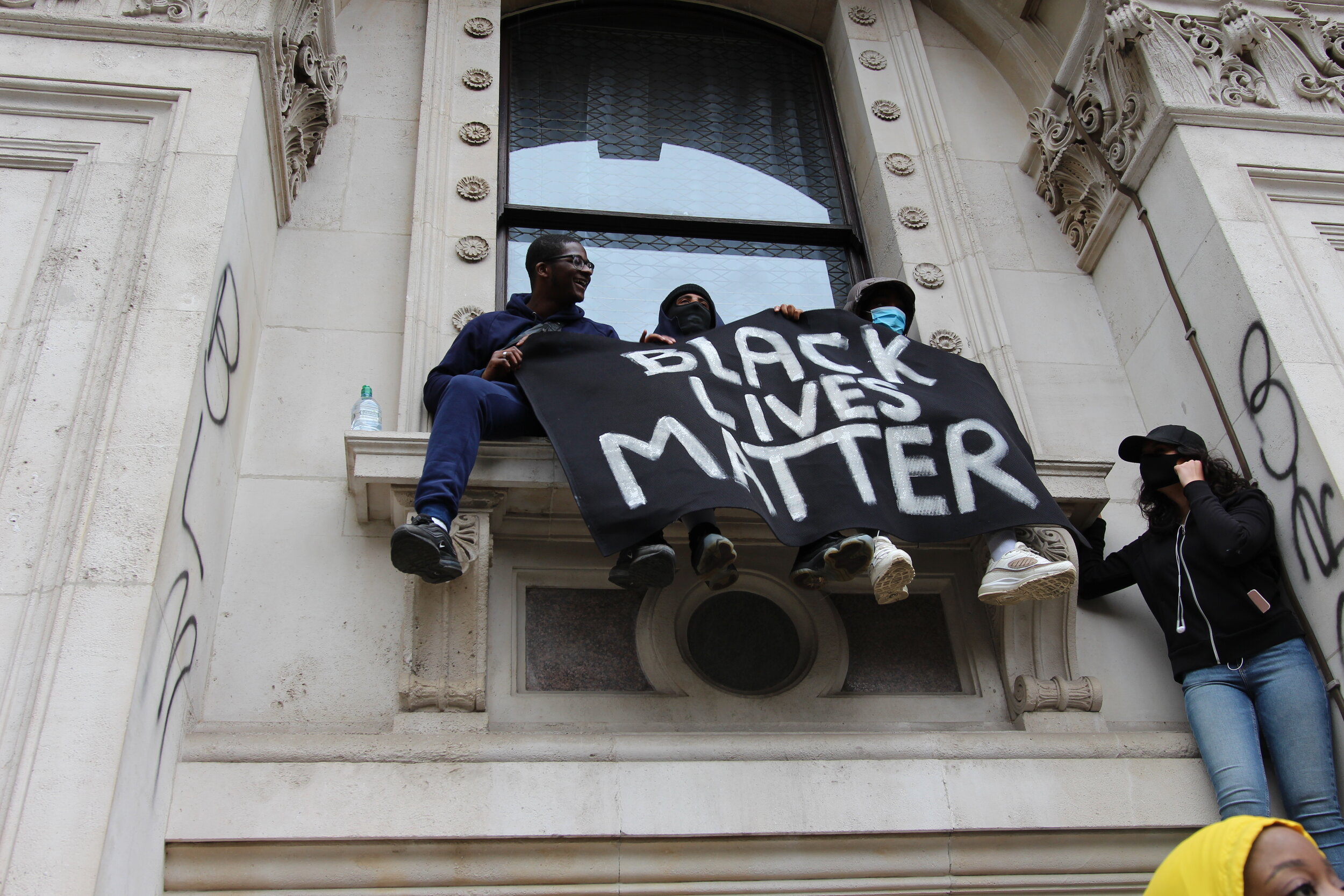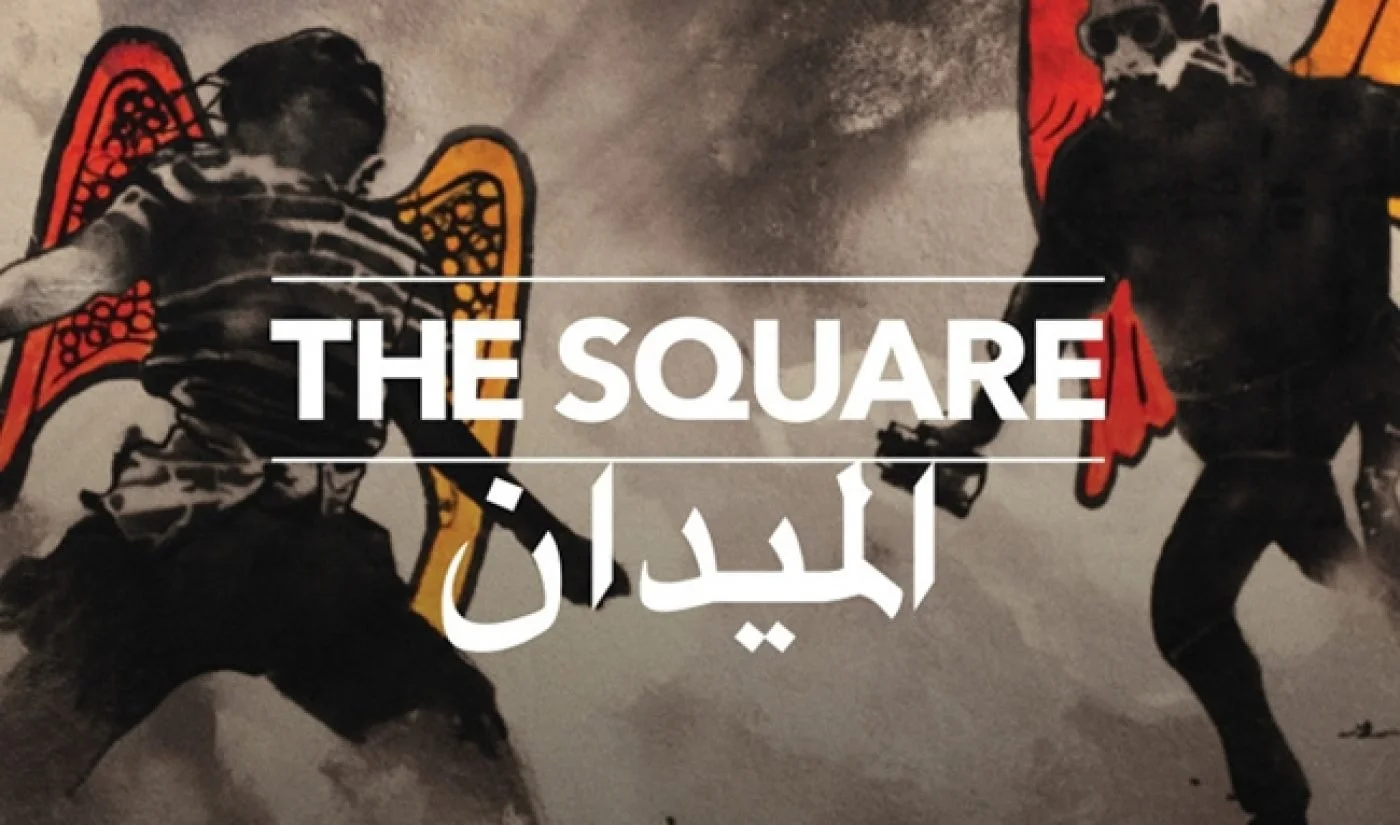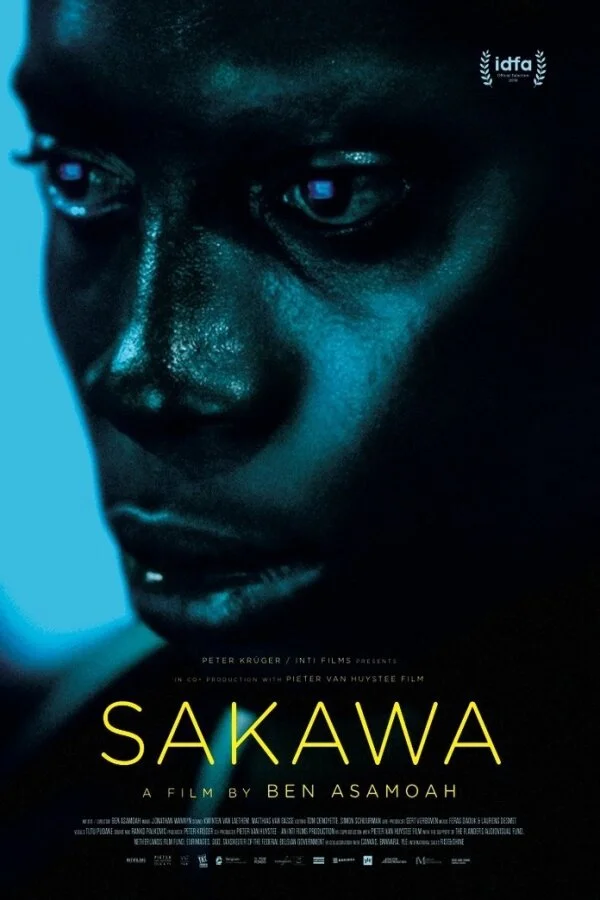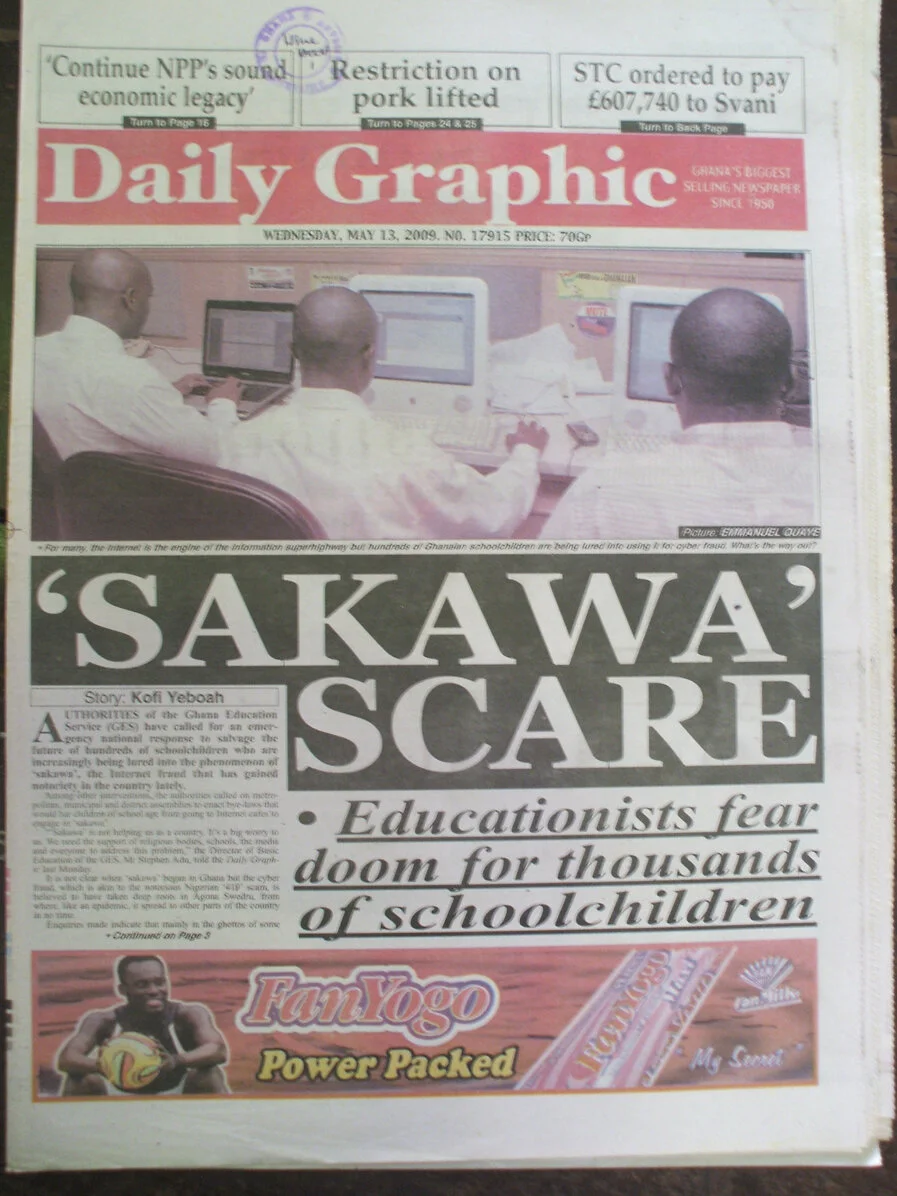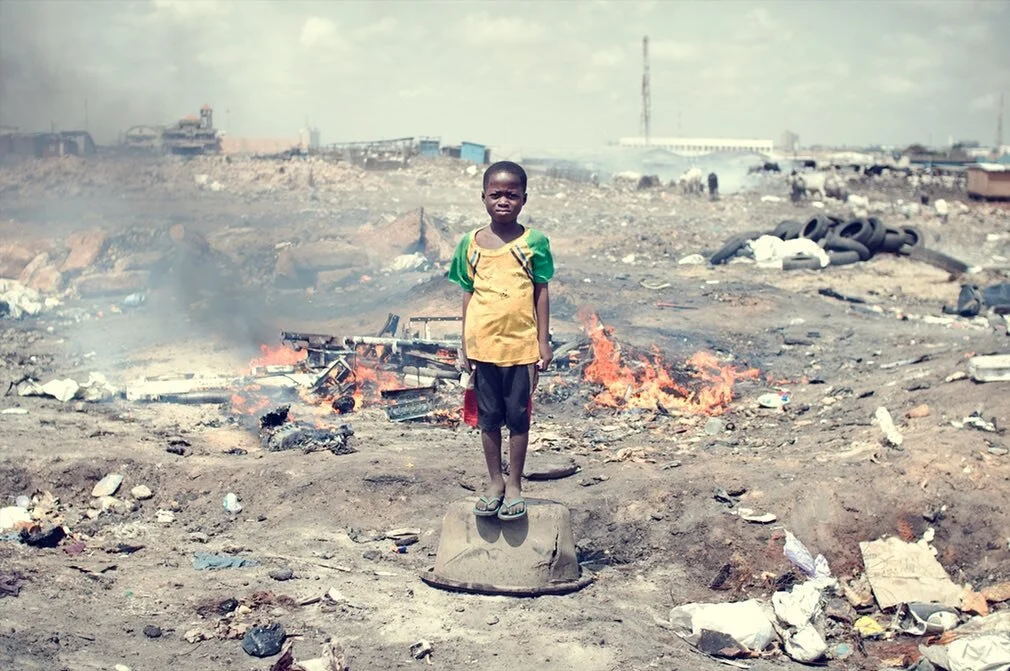Narratives is a book written by the rapper Akala. Written in 2019, the book is partially a memoir and a statement/analysis of race and class, and the various historical eras and subsequent impact on contemporary British society. The book explores the Britains colonial past and how contemporary British society is inherently linked to the British Empire. This is reflected in British society, mainly through how perceptions of race, class and conflicts play out. He uses his personal experience to explain the impact of these societal constructs on the working-class and minority groups. In particular, he examines the impact of diaspora music.
The Square: Inside The Revolution
Sakawa: A Machiavellian practise or a Spiritual Way of Life
Courtesy of IMDB
Sakawa is a documentary directed by Ben Asamoah about a group of young Ghanaians that turn to internet fraud to help them with a desperate situation. Sakawa is a Ghanaian term for illegal practices that combine modern Internet-based fraud with African traditionalist rituals. The term or word Sakawa is a Hausa word that means putting inside, how to make money. The rituals, which are mostly in the form of sacrifices, are intended to spiritually manipulate victims so that the scammer's fraud is successful.
Courtesy of Cambridge University Press
Courtesy of Environmental Justice Atlas
The film utilises a unique approach to the concept of online fraud. He focuses entirely on those engaged in Sakawa as a way of life. For many poor Ghanaians, Sakawa is their only means to make money. The film is a dark statement on the unintended consequences of technological advancement. Many of the e-waste dumps depicted in the movie are the product of the west’s overconsumption of technology; however, this same technology would eventually be used by locals against westerners. Campbell suggests that the term “digital religion” describes “this merging of new and established notions of religious practice means digital religion is imprinted by both the traits of online culture and traditional religion."1. This concept is embodied in the practice of Sakawa.
Courtesy of Screen Anarchy.
Unlike most documentaries on this subject, he does not focus on westerners being victims of fraud. Instead, he wanted to tell the story of those engaged in Sakawa as a way of life. The e-waste scene, for instance, is compelling. The dump signifies Ghanians frustrations. On the one hand, you have the boys and girls that practise Sakawa, and you can condemn them; on the other hand, there is us in the west that contribute to this environment getting polluted. The implementation of their personal stories helps demonstrate how Sakawa is an unwanted necessity for many poor Ghanaians. Its Machiavellian principle used ironically against the West, the end justifies the means. In the film, no white people are not shown, but they are spoken about in the context of wealthy countries such as Canada, the UK and America. Showing how the West and white people in Ghana are associated with prosperity. You cannot blame them because this is the narrative they are fed through the internet, TV, or returning immigrants.
Courtesy of Docville.
There is a scene where the Director enables an individual to tell his story, the scene is extremely powerful. In it, the man explains, “I have been through it all. I used to be a houseboy. A man cooking for a white woman. Can you imagine? I cannot even cook. So, I used to call my mother. When I called her... she would explain to me how to cook...I used to buy fish for, like 250 euros. In one week... She would eat fish worth 250 euros and pay me 12 euros a month. For the whole month. And she spent 500 euros in 2 weeks on fish. Thats allot. So, don’t feel guilty about the white people. There is no one here to help us. We’ve got to help our family That’s true. With no degree, government jobs are not an option”. The Director essentially shows how Sakawa is necessary to get to the next stage of their life so rather than being depicted as an oppressor they are victimising and victims. The film also demonstrates the importance of Voodoo(also known Vodun, Vodú and Vodou) in Ghanian society, he highlights the difference in the meaning of Voodoo in the west vs global south. In the west, Voodoo is associated with revenge, blood, sacrifice, evil and the devil. In reality, Voodoo's spiritual practice is about balance, energy, and how to learn more about the universe.
Courtesy of Continent Tour
Courtesy of Cambridge University Press
Courtesy of Sakawa
What makes the film convincing the director film style. The filmmaker blurs the line between observational documentary and setting up the scene. He does not care whether this disqualifies the film as a documentary. In terms of emotions, he believes it is essential to convey what is being felt. He also wanted to get away from the rock role way of shooting documentaries in Africa(i.e. handheld) and instead framed it and shot it beautifully to show Ghana in a beautiful light, humanise the people's stories, in tern making the narrative more convincing and relatable. Through focusing on Sakawa boys, the driver behind the narrative also makes the overall argument more convincing. However, the limitations of the film are what it does not depict. The Director only shows the entry-level to Sakawa and does not show the top tier fraudsters such as Hush puppy. Furthermore, an opportunity I felt was missed to the relationship between Sakawa and other regional fraudsters such as Yahoo boys/419 from Nigeria, who have much more different oppressive dynamic with government and police. Also, the role of the Abrahamic religions in Africa and their views on Sakawa was under-explored. Overall, the films raises important questions of whom the digitalisation of Africa benefits. With a large investment in ICT’s from china in countries like Ethiopia and Ghana, you would expect this to revolutionise life for the average Ghanian. However, the fact that Sakawa is a necessity for many Ghanaians raises the question. Whom is it benefiting?
References:
Sakawa, 2018 [online] Ben Asamoah, Netherlands 15/02/2021, Youtube
Photos/Videos
https://www.imdb.com/title/tt9617614/mediaviewer/rm4121583872/
https://file.ejatlas.org/img/Conflict/2837/74b3b300-d205-4c85-8ef9-d98685f55f35-2060x1368.jpeghttps://www.cinemaescapist.com/2020/02/review-sakawa-ghana-movie/
https://haenfler.sites.grinnell.edu/wp-content/uploads/2018/10/Sakawa-poster.png
https://www.cambridge.org/core/journals/african-studies-review/article/abs/sakawa-rituals-and-cyberfraud-in-ghanaian-popular-video-movies/063807DDAF1C7785834F32AEDD0BC491
https://continenttours.com/africa-destinations/ghana-togo-benin-including-annual-ouidah-voodoo-festival-jan-2020/
https://sakawa-film.be/voodoo
https://www.youtube.com/watch?v=ttT1hYRPD1k&t=4s
Urban Front does not own any of the rights to the photo & videos used in this article. All photos and videos are used under fair use.Top Boy Review - Grimier and Grittier than ever
Top Boy the exciting UK series that depicted struggles of urban life in poor communities became UK cult classic due to its realistic depiction, excellent camera work, sound & music, writing and raising awareness of the real issue of inner-city London communities. It enjoyed success for two series when it originally aired on Channel 4, however the show was brought abruptly to end and many believed it would never see the light of day again.
Drake a Toronto native and a world hip hop star, for a long time, has taken a liking to UK urban and black culture through grime and UK rap, while many such as Wiley perceived him to be a culture vulture he continued to show love to the UK. However it still came as surprise when he decided to bring back Top boy through partnering up with Netflix as well as bringing back the original cast 6 years since it had last aired. While many people got overhyped and some were sceptical, there was no denying there was the anticipation for the show would it surpass the original or would it be a misrepresentation of UK culture?
Especially with newcomers such as the renowned rapper Dave who has collaborated with Drake in the past, this was the first time he gets an opportunity to display his acting skills and if the show is successful it would be a big move for him.
I am glad to say the show surpasses expectations and is a satisfying watch. The level of quality in production is to an extremely high standard. When I first started watching it almost put me off due to the extreme cinematic advancement in comparison to the previous series, but once I adjusted there was no doubt that it was beautifully shot. The story itself is well laid out, complex but easy to a follow with high stakes and plenty of plot twist. Top Boy still retains the shock value, it feels bracingly different to almost every other TV drama around, and it continues to carve its path. As with its predecessors, the action is set in the heart of the drug-based gang wars of east London.
Without trying to spoil too much I will go over plot events and highlights of the show. It begins in Jamaica with Dushane far from the streets they used to run. He is lying low, struggling to live a civilian life while his ego keeps reminding him of the status he once commanded, faced with some extreme circumstances he is forced to go back to London. Sully, played with heartbreaking bluster and fragility by Kane “Kano” Robinson, is in prison, trying to keep his nose clean ahead of his imminent release.
However, a new generation of criminals is more than happy to step into the shoes that have been left vacant. Jamie (Michael Ward) is a sweet kid who takes care of his two younger brothers following the deaths of their parents. He is also a violent and ruthless gangster, this duality not only defines this character but also has huge subsequent impact on other characters and narrative arks. The other protagonist Modie played by Dave is in prison. These characters are all struggling for power and influence and there are many other characters narratives and plots from a love interest, family to betrayal that all play into the power dynamic. The characters are all rich well developed and are only an improvement on their character development from the previous show while new character such as dave is extremely unique, vibrant and bring allot show and are iconic
And the violence is gruesome. There are plenty of guns, knives and baseball bats. There are moments of excitement and confusion as disturbing ones too. The changes that are sometimes violent brought to top boy world symbolize the changing landscape of London. The Turks are the new Albanians, controlling the drugs supply until the younger, hungrier gangs grab at a brutal solution to a pricing problem. The fractious atmosphere of British society is always lurking in the background. County lines drug-dealing takes familiar characters to Ramsgate, against a backdrop of asylum seekers being abused and exploited on all sides. In London, immigration officials are cracking down using paperwork, fear-mongering and bureaucracy.
However while the show does give subtle references to previous story arks from its predecessor show, it fails to really continue to develop these in new series other than narratives of main characters such as the story of Michael, who’s only referenced in the new show is a brief flashback. It would have been a nice addition to hardcore returning fans of the show however ultimately I feel this is beneficial to the show it is not too reliant on the success and narratives of the previous show and instead comes up with unique narrative that are realistic scenarios and exciting to show but still relevant to overall series.
As result the series feels fresh new and rather than a bad continuation or remake of the original. The start at the beginning in Jamaica also could have been better executed the characters in jamaica were not as well executed or developed as London characters. For obvious reason the Jamaican accent/patois was watered down for television, however the real flaws lie in people such as Dushane’s cousin and Sugar. They are not as developed as other characters on the show due to their brief appearances however this is not to underestimate their overall importance to narrative ark as they still play significant role. Other characters such as crazy eye’d Jamaican (forgot the dons name) and Alessandro Babalola played by Haze do bring more to the role however it would have been nice to know more about the Jamaican characters motives and relationships rather than them just being a motive for the Dushane to go back to the UK.
Ultimately the show is an extremely good watch, I binged it and it surpassed my expectations that I had developed from watching the original. The characters are well developed the narratives are complex and interesting, It is extremely well shot, the show references real-life issues from gun and knife crime, county lines, acid attacks, deportation, drug addiction, single parents and more that occur in the UK today however it does this in an entertaining way not over the top and lot of these scenes hold serious weight. Overall I would give the show an 8.5 - 9 out of 10 or 4/5 stars

